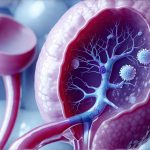Chronic inflammation is increasingly recognized as a core component of many modern diseases, ranging from cardiovascular disease and diabetes to autoimmune conditions and even certain cancers. For years, we’ve focused on lifestyle factors like diet, stress, and exercise as primary drivers of this systemic inflammatory state. However, emerging research suggests that often overlooked areas of the body – particularly oral health – may play a far more significant role than previously understood. The mouth isn’t an isolated entity; it’s a gateway to the rest of the system, and what happens there can have ripple effects throughout the entire body.
The connection between seemingly disparate conditions like dental health and chronic inflammatory diseases stems from the constant interplay between the oral microbiome – the vast community of bacteria residing in our mouths – and our immune system. When oral hygiene is poor, or when specific periodontal (gum) disease develops, this delicate balance is disrupted. This disruption can lead to a cascade of events that promote systemic inflammation, potentially exacerbating or even contributing to conditions seemingly unrelated to the mouth. Understanding these connections isn’t about demonizing dentists; it’s about recognizing the holistic nature of health and adopting comprehensive strategies for wellness.
The Oral Microbiome & Systemic Inflammation
The human mouth is home to hundreds of different bacterial species, some beneficial and others potentially harmful. A healthy oral microbiome exists in a state of dynamic equilibrium – a balance where good bacteria keep the bad ones in check. However, factors like poor oral hygiene (infrequent brushing and flossing), diet high in sugars and processed foods, smoking, stress, and certain medications can disrupt this delicate balance, allowing pathogenic bacteria to flourish. This shift isn’t merely a local problem; it initiates an immune response.
When harmful bacteria proliferate, the body’s immune system kicks into gear to fight off the infection. While this is a necessary process, chronic exposure to these bacterial challenges – as seen in periodontal disease – can lead to chronic activation of the immune system. This constant stimulation results in the release of inflammatory mediators (cytokines, C-reactive protein, etc.) that don’t stay confined to the mouth. These mediators enter the bloodstream and circulate throughout the body, contributing to systemic inflammation. It’s like a low-grade fire constantly smoldering within the body, increasing the risk for other health problems.
Periodontal disease, specifically gingivitis (inflammation of the gums) and periodontitis (more severe gum disease with bone loss), is strongly linked to increased levels of inflammatory markers in the blood. Studies have shown correlations between periodontal disease severity and biomarkers associated with cardiovascular disease, diabetes, rheumatoid arthritis, and other chronic conditions. The bacterial products from inflamed gums can even directly affect other organs – for example, bacteria like Porphyromonas gingivalis have been found in brain tissue of Alzheimer’s patients, suggesting a potential link between gum disease and cognitive decline.
Dental Health & Bladder Inflammation (Cystitis)
The connection between dental health and cystitis—inflammation of the bladder – is less direct than some other systemic links but is gaining increasing attention through research. The primary pathway appears to be related to the immune system’s overreaction triggered by chronic oral inflammation, coupled with potential shifts in the gut microbiome influenced by overall inflammatory state. While bacterial urinary tract infections (UTIs) are the most common cause of cystitis, a significant portion of cases involve non-infectious or recurrent cystitis that may be linked to underlying systemic inflammation.
Chronic inflammation, as established through dental issues, weakens the immune system’s ability to regulate itself. This can lead to heightened sensitivity and reactivity in various parts of the body, including the bladder. A hyperactive immune response in the bladder lining can mimic infection symptoms, causing pain, urgency, and frequency even without bacterial presence – this is often referred to as interstitial cystitis/bladder pain syndrome (IC/BPS). Furthermore, systemic inflammation impacts gut health. An imbalanced gut microbiome—often worsened by chronic inflammation—can influence bladder function through the gut-bladder axis, a bidirectional communication pathway between these two systems.
The oral microbiome and gut microbiome are interconnected. Systemic inflammation originating from poor dental health can negatively impact the composition of the gut microbiome, leading to increased intestinal permeability (“leaky gut”). This allows bacterial products and toxins to enter the bloodstream, further exacerbating systemic inflammation and potentially triggering or worsening bladder symptoms. It’s a complex interplay where one area of chronic inflammation (the mouth) sets off a chain reaction affecting other areas of the body, including the urinary tract.
Understanding the Gut-Bladder Axis
The gut-bladder axis is a relatively new area of research but highlights the strong connection between digestive health and bladder function. The gut microbiome plays a crucial role in modulating immune responses throughout the body, and imbalances in gut bacteria can directly impact bladder health.
- Microbial Metabolites: Gut bacteria produce various metabolites (short-chain fatty acids, neurotransmitters) that influence inflammation levels and nerve signaling. Altered microbial composition due to systemic inflammation from oral sources can shift metabolite production, impacting bladder function.
- Immune Modulation: The gut is a major site of immune cell activity. An inflamed gut—worsened by poor dental health’s impact on overall inflammatory state – leads to an overactive and dysregulated immune system that can attack the bladder lining, contributing to IC/BPS symptoms.
- Nervous System Connection: The gut and bladder share neural pathways. Altered gut microbiome composition and resulting inflammation can affect nerve signaling to the bladder, increasing sensitivity and urgency.
Addressing gut health through dietary changes (prebiotic and probiotic-rich foods), stress management, and potentially targeted supplementation can be a crucial component of managing non-infectious cystitis, especially when coupled with improved dental hygiene.
The Role of Cytokines & Inflammation Markers
Cytokines are small proteins used by the immune system to communicate and regulate inflammation. Chronic oral inflammation, particularly from periodontal disease, results in elevated levels of pro-inflammatory cytokines such as IL-1β, TNF-α, and IL-6 circulating throughout the body. These aren’t just localized responses; they contribute to systemic inflammatory burden.
- Systemic Spread: Elevated cytokine levels impact various organs and tissues, increasing risk for chronic diseases and contributing to bladder inflammation.
- Bladder Lining Damage: Pro-inflammatory cytokines can directly damage the urothelium – the protective lining of the bladder – making it more susceptible to irritation and inflammation. This disruption contributes to IC/BPS symptoms.
- Increased Pain Sensitivity: Cytokines can sensitize nerve endings in the bladder, leading to heightened pain perception even without significant structural damage.
Measuring levels of inflammatory markers like C-reactive protein (CRP) and erythrocyte sedimentation rate (ESR) can provide insight into overall inflammation levels. While these aren’t specific to dental or bladder health, they help assess the systemic impact of chronic inflammation originating from various sources, including oral disease.
Proactive Steps for Better Oral & Systemic Health
Bold statement: Prioritizing preventative dental care is a crucial investment in your overall health and well-being – including potential benefits for urinary tract health. Here are some proactive steps:
- Regular Dental Checkups: Visit your dentist at least twice yearly for professional cleanings and examinations. Early detection and treatment of periodontal disease can significantly reduce systemic inflammation.
- Excellent Oral Hygiene: Brush your teeth twice daily with fluoride toothpaste and floss regularly to remove plaque and bacteria. Consider using an interdental brush or water flosser for more thorough cleaning.
- Dietary Modifications: Reduce sugar intake, limit processed foods, and incorporate a diet rich in anti-inflammatory foods like fruits, vegetables, and omega-3 fatty acids.
- Address Gut Health: Explore ways to support a healthy gut microbiome through dietary changes (probiotic-rich yogurt, kefir, fermented foods) or supplementation after consulting with a healthcare professional.
- Stress Management: Chronic stress weakens the immune system and contributes to inflammation. Practice stress-reducing techniques like yoga, meditation, or deep breathing exercises.
Disclaimer: This article provides general information and should not be considered medical advice. If you are experiencing symptoms of cystitis or have concerns about your dental health, please consult with a qualified healthcare professional for diagnosis and treatment.





















